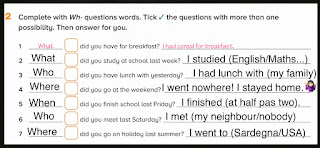READING ACTIVITY:
Page 67 on your book.
Activity 2: Look, copy and complete.//Mira, copia y completa.
SOLUTIONS
From Monday 8th to Friday 12th
READING ACTIVITY
Story (pages 62 and 63).
2.- Read and listen.//Lee y escucha.
3.- "After you read": Answer the questions in your notebook.//"Después de leer": Responde las preguntas en tu cuaderno.
SOLUTIONS
From June 1st to June 5th
READING ACTIVITY
(Activity Book page 49, activity 3)
Read and complete.//Lee y completa.
SOLUTIONS
WRITING ACTIVITY.
Go over the information box in activity 2 (in fact it's a revision of lesson 3 of last week).//Repasa el cuadrito de información de la actividad 2 (en realidad es un repaso de la "lesson 3" de la semana pasada).
Now go to Activity Book page 48, activity 2. Complete; then answer for you with "Yes, I am" or "No, I'm not".//Completa; después responde sobre ti mismo/a con "Yes, I am" o "No, I'm not".
Now go to Activity Book page 48, activity 2. Complete; then answer for you with "Yes, I am" or "No, I'm not".//Completa; después responde sobre ti mismo/a con "Yes, I am" o "No, I'm not".
SOLUTIONS
From May 18th to May 22nd
First of all, go over Lesson 3./Primero de todo, repasa la Lesson
3.
READING ACTIVITY
Page 59 activity 2. Copy and complete./Copia y completa (OJO: Dice
"Copia". Copia las frases,
please.)
LISTENING ACTIVITY.
Page 59 activity 3. Listen and write who./Escucha y escribe quién es:
Anota los números del 1 al 6 y luego al escuchar sólo tienes que apuntar los
nombres de las personas.
SOLUTIONS
Nº2: El texto no dice exactamente que Daisy vaya a hacer fotos, pero dice que se va a llevar la cámara. ¿Para qué? No sé...🤔😜
Por cierto:
Go hiking=ir de senderismo, hacer senderismo.
From May 11th to May 15th
LISTENING ACTIVITY
(Activity Book page 45 activity 1)
Copy, listen and complete./Copia, escucha y completa.
(Activity Book page 45 activity 1)
Copy, listen and complete./Copia, escucha y completa.
SOLUTIONS
From May 4th to May 8th
Listening activity.
Watch the video "What the Romans did for us". Then answer the questions below./Ve el vídeo "Lo que los romanos hicieron por nosotros". Luego responde a las preguntas de abajo.
VOCABULARY:
to spread: extender, esparcir
to reach: alcanzar
stall: puesto, puestecillo
QUESTIONS:
- What was the Roman name for Great Britain?
- When did Romans reach Britannia?
- How long did Romans stay in Britannia?
- Where could the Roman souldiers find food stalls?
- What is the meaning of the following expressions in Spanish?
Roman numerals
architecture
concrete
architecture
concrete
SOLUTIONS
- The Roman name for Great Britain was Britannia.
- They reached Britannia in the year 43 (AD=after the death of Christ=después de la muerte de Cristo*).
- They stayed about 400 years.
- They could find food stalls in towns and forts.
- Roman numerals = números romanos / architecture = arquitectura / concrete = 1)concreto-a 2)cemento u hormigón (usan la misma palabra para ambos materiales)
*En inglés usan siglas diferentes a las nuestras para estas expresiones:
- antes de Cristo: a.C. = before Christ: B.C. (las dos mayúsculas)
- después de Cristo: d.C. = after the death of Christ: A.D. (La D Es de la palabra DEATH=muerte).
From April 27th to April 30th
WRITING ACTIVITY
Activity Book page 44; activity 1 (Please, copy the sentences on your notebook)./(Por favor, copia las oraciones en tu cuaderno).
If you still don’t have access to your Activity Book, I leave the picture here./Si todavía no tienes acceso a tu Activity Book, aquí te dejo la imagen.
SOLUTIONS
From April 20th to April 24th READING ACTIVITY:
A clue: start always at the red point (“You are here”).
Una pista: empieza siempre desde el punto rojo (“Usted está aquí “).
SOLUTIONS (April 20th to April 24th)
SOLUTIONS (April 14th to April 17th)
Ya sabéis que lo que está entre paréntesis es porque no es la única respuesta posible (no todo el mundo terminó el cole a las dos y media, o quedó son sus vecinos, o no quedó con nadie, o fue de vacaciones al mismo sitio).
WRITING ACTIVITY:
- Guess what? ("Adivina")... ¡Correcto! Esta actividad no está en tu libro.
- Lo hay que imprimirla. Pon "LESSON 4", copia con boli azul y respone con lápiz.
- Te la explico porque es un poquito difícil de entender (no de hacer). Completa con los pronombres interrogativos (ya sabes:los que empiezan con "Wh" en inglés). Marca con un "tick" las que admiten varias opciones (en algunas preguntas se puede poner, por ejemplo, "when" o "where" y estar bien de las dos formas, aunque se interpreten de forma diferente, claro está). Finalmente, responde a las preguntas pensando en tí mismo/a.
- Ejemplo en castellano: ¿______ comiste ayer? Puedes completar con "Qué" o con "Dónde", aunque la respuesta variará según lo que pongas finalmente.
¿Entendido? Pues manos a la obra.
SOLUTIONS
Page 51 activity 2 (you just have to read the text/simplemente tienes que leer el texto).
Activity 3:
New words
many: muchos
to carry (past: carried): llevar, transportar
to burn (past: burned): quemar
to heat: calentar
fire: fuego
through: a través de
soap: jabón
to clean: limpiar
skin: piel
SOLUTIONS
Page 49:
- En la actividad 1 sólo hay que escuchar mientras lees para aprender a pronunciar y comprender el texto. Después copiar las palabras nuevas y los tres verbos irregulares que ahora aparecen más abajo.
- Para la actividad 2 (“Answer the questions”), estas son las respuestas correctas:
En las respuestas para los números 2 y 5, ya sabes que se puede sustituir el nombre propio por el pronombre she (para evitar repetir tanto).
New words:
documentary: documental
to tie: anudar, atar, sujetar
clay: arcilla
Irregular verbs:
to read (leer) - read (past tense) *La diferencia está en la pronunciación; fíjate oyendo el audio.
to build (edificar) - built (past tense)
to write (escribir) - wrote (past tense)

















